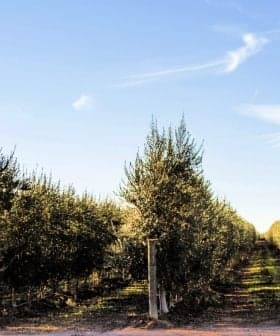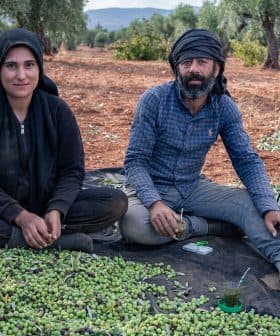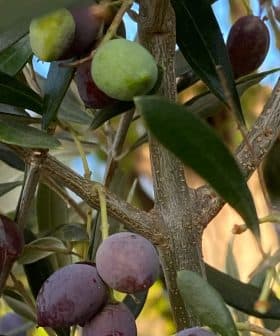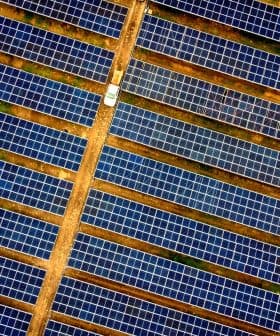Spring Freeze Devastates Crops in Europe
Unseasonably cold weather damaged blossoming olive trees in France, Greece and Italy. The full extent of the damage will be known in the coming weeks.
A cold snap in Europe has caused significant damage to crops, particularly in Italy, where fruit trees and vineyards have been severely impacted. The freeze has led to a decrease in crop yields, with some regions experiencing up to a 75 percent reduction, prompting calls for financial support and innovation in risk management instruments.
A sudden cold snap stretching from France to Greece has damaged a range of crops at crucial moments in their development, including olive trees.
Farmers in Italy have been hit particularly hard by the unseasonably cold weather. Freezing temperatures abruptly interrupted the otherwise warm spring and impacted the blossoming of fruit trees.
According to the first estimates, freezing nights have affected a range of fruit and vegetable crops, with a specific concern for vineyards, particularly exposed ones in the northerly Po Valley.
Damage has also been recorded in the southern Italian region of Puglia, according to the farmers association Coldiretti. Temperatures dropped as low as –5 ºC in areas of the olive-oil-rich region and fruit (not only olive) yields “have been halved.”
See Also:Climate Change UpdatesIn the following weeks, it will also be possible to understand the extent of the damage to olive groves in the south of the country, in which the previously high temperatures had triggered the early stages of flowering.
According to the Italian Confederation of Farmers (CIA), the central and northern regions of Tuscany, Emilia Romagna, Veneto and Piedmont were severely hit.
In these areas, damages could impact up to 75 percent of the crop yields. The CIA explained that in Tuscany, where temperatures had dropped to –7 ºC in certain areas, some farmers chose to set hay bales on fire to raise the temperatures in the vineyards during the coldest nights.
In Umbria, olive growers are still estimating the damages after the temperature shock, with a sudden drop from 27 ºC to –8 ºC. “The frost has certainly left its mark there,” the confederation said.
In Umbria, more damage is expected in the region’s vineyards. “Under these conditions, even with a perfect climate, the harvest will be disappointing,” the CIA said.
Overall, the confederation estimates that the low temperatures in April have cut Italian agriculture yields by at least 60 percent across the country.
“We are monitoring the situation,” Dino Scanavino, the president of the CIA, said. “A quick response is needed, such as the declaration of a natural disaster to activate the compensation procedures for farmers.”
“At the same time, we need to boost innovation in risk management instruments, which must face the climate change in progress,” he added. “It is also needed to stimulate and increase the contribution to crop, animal and plant insurance.”
Scanavino also asked for new funds from European and national sources to finance “innovative technological systems of crop protection.”
Rainfall that followed the frost has also hurt producers, Coldietti added. While rainfall in the Po Valley was 92 percent below average in March, the latest heavy storms might do more harm than good to relieve the drought.
Coldiretti said that crop regions need steady and consistent rains to reverse the current hydrological scarcity but do not benefit from short periods of heavy rains, which do more damage than good.
According to Coldiretti, the steady increase of extreme weather events has caused more than €14 billion of damage to Italian agriculture.
In Greece, freezing temperatures in a few areas have severely impacted a range of fruit and vegetable crops, including vineyards and some olive groves.
According to Agrotypos, olive growers are just now beginning to estimate the true extent of the damages in some areas of the Peloponnese peninsula. The organic agriculture cooperative, Biolivia, in Olynthos, said that freeze has impacted olive growers, with some groves in Halkdiki hit by frost.
However, the overall situation is not comparable to what happened with the frost in Italy.
“Regarding the last 10 days, we haven’t had any particular problems with the weather conditions in Greece and the general conditions were good for the cultivation almost all over Greece,” Kostas Liris, a strategic consultant for the agri-food industry and NYIOOC World Olive Oil Competition panel leader, told Olive Oil Times.
“We have had minor problems between March 23 to 26, with temperatures dropping below zero in several places,” he added. “We even had snow in the eastern islands of the Aegean Sea, but that lasted for a few hours, so it didn’t affect the general condition of the olive trees or other cultivation.”
“A few small producers in specific areas have now reported some icy nights and a few hail events, but those did not affect the crops as a whole,” Liris continued. “At the moment, the general climate conditions seem favorable, and these events will not affect production.”
For Liris, the water shortage facing the Mediterranean basin will pose a much larger problem for Greek producers in the current crop year.
However, farmers in France have not been so lucky. Serious damage has been reported across the wine-soaked south of the country, where temperatures dropped as low as –6 ºC.
According to WineMag, much of the damage caused to the current grape crop is due to above the average temperatures recorded in March followed by the freezing April days.
All main wine production areas, which include the most productive olive growing regions in the country, were hammered by the freeze. Grape production is expected to decrease by 50 to 100 percent in some areas.
However, Alexandra Paris, the communication and economics director at France Olive, told Olive Oil Times that it is still too early to determine how these adverse weather events will impact olive growers.
“The effects of frost are still difficult to pinpoint on olive trees,” she said. “The floral shoots were more or less advanced depending on the territory, but the flowers are not there yet. We should know more within 15 days to three weeks.”









